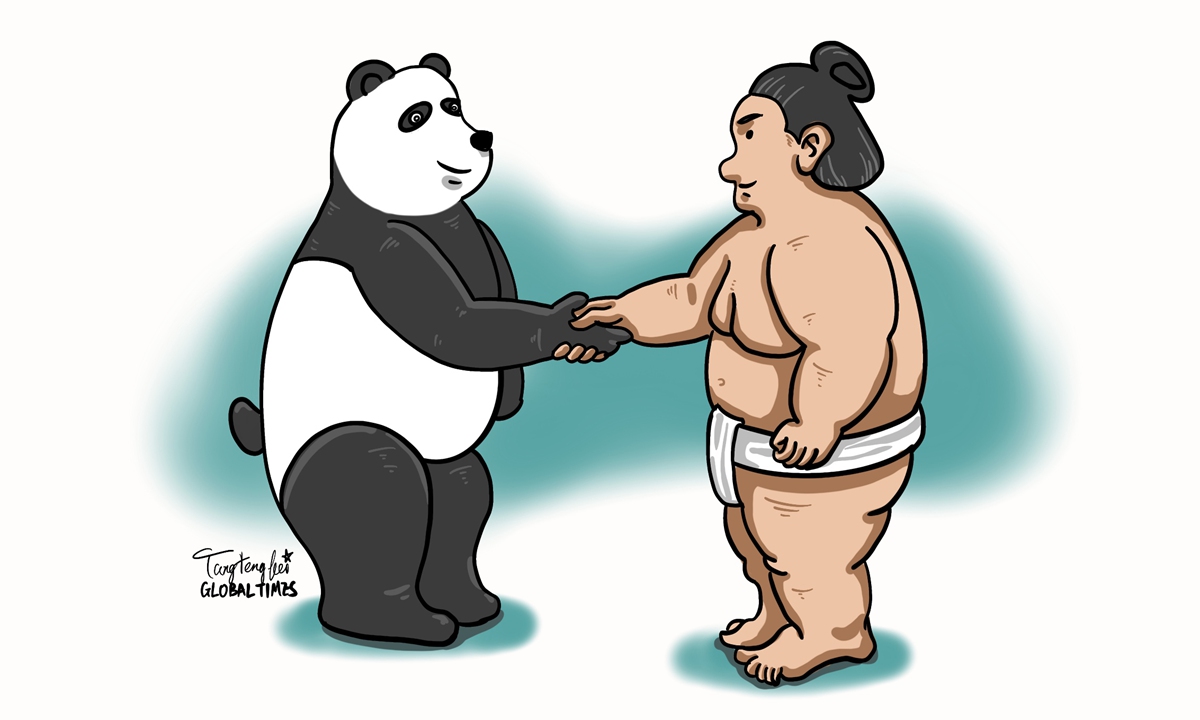Suga-led Japan would not follow Trump’s decoupling strategy
Source: Global Times Published: 2020/9/15 20:34:53

Illustration: Tang Tengfei/GT
Yoshihide Suga, new president of Japan's Liberal Democratic Party, is set to succeed Shinzo Abe as the country's prime minister soon. With COVID-19 containment and economic rebooting as his primary tasks, it is believed that, rather than recklessly following the US' "decoupling China" policy, Suga-led Japan will further enhance Japan's economic and trade ties with China.The 71-year-old Suga has served as Abe's chief cabinet secretary for nearly eight years, actively participating in Japan's policy-making for pandemic prevention and related economic policies. As China-US tensions escalate, diplomatic environment for Japan remains complex with the US as its sole military ally, while China as its largest trading partner.
However, as long as Tokyo could blunt extreme coercion of the US, Japan would not turn its back to China, against the backdrop of the contracting global economy and a weak domestic economic growing momentum.
The underlying logic is simple and straight. Domestically speaking, Japan has seen its market scope reaching saturation. As an export-oriented economy, its decades of development experience revealed that expanding export has been an initiation point and an effective approach for it to reverse a recession.
With the novel coronavirus continuing to sweep the world, major consumer markets are facing dim containment situations. Per IMF estimation, China could be the only major economy realizing a positive economic growth this year. With the epidemic under firm control, Chinese economy has demonstrated resilience, and fast recovery from the fallout of the virus.
Latest data showed that China's foreign trade reached 2.88 trillion yuan ($421.69 billion) in August, up 6 percent year-on-year, according to the General Administration of Customs.
Meanwhile, the US, with the largest number of confirmed coronavirus infections, could see its economy shrink 8 percent this year, and the EU common market may slide even harder by 10.2 percent, according to estimates by the IMF in June.
It is true that the US would never stay low-key on the international stage and will remain as a variable for Japan's diplomatic framework. Alongside the Trump administration's promotion of decoupling from China, Japan has also rolled out measures to encourage its firms to retrieve from China, and even bonded with India and Australia to propose a so-called "Supply Chain Resilience Initiative" with the intention of reducing dependence on China.
However, simply combining Australia's natural resources and Japan's manufacturing ability can hardly build a new supply chain. And with poor infrastructure, unskilled labor force and other shortcoming, India is not ready to receive Japan's technology or capital.
Also, a small-scale of relocation of industrial chains of lower-end industries is reasonable inner adjustment of companies, due to the evolution of global or regional economies.
However, massive retreat of Japanese investment from China market out of purely political reasons seems highly impossible since it would go against the normal economic principles and Japan's own interests.
Suga recently expressed his intention to seek solid communication with neighboring countries such as China and South Korea, Reuters reported. Under the current circumstances, it is expected that the overall China-Japan economic and trade relations will be maintained and even enhanced.
The article was compiled based on an interview with professor Zhang Jifeng, former vice director of the Institute of Japanese Studies at the Chinese Academy of Social Sciences. bizopinion@globaltimes.com.cn
Posted in: EXPERT ASSESSMENT